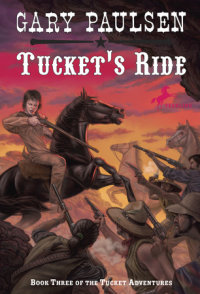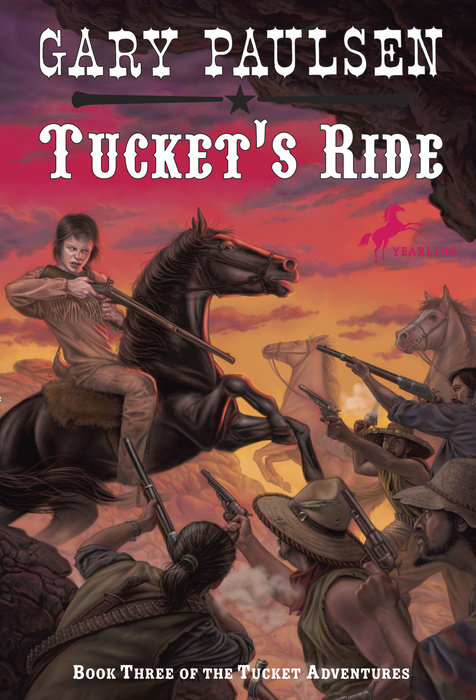Tucket's Ride
Tucket's Ride is a part of the The Francis Tucket Books collection.
Francis Tucket and his adopted family, Lottie and Billy, are heading west in search of Francis's parents on the Oregon Trail. But when winter comes early, Francis turns south to avoid the cold, and leads them right into enemy territory--the Mexican War of 1848. Francis and the children are captured by desperadoes, but loyalty, courage, and the element of surprise offer hope for survival.
An Excerpt fromTucket's Ride
Francis Tucket lay on the ridge and watched the adobe hut a hundred yards away and slightly below him. He had his rifle resting on a hump of dirt, the sights unmoving, pointed at the doorway to the hut.
"Are we really going to stay here forever? I mean it's really cold. I've been cold before but not like this." A small girl and boy stood ten yards to his rear with the horse and mule, all hidden below the level of the ridge. "It just seems that since you haven't seen anything, we could go down there and get warm. There might be a stove..."
"Please be quiet, Lottie." Francis turned and held his hand out. "Now. We're going to wait. I heard something somewhere down there that sounded like a scream. We're going to wait and watch. Be quiet."
There was a horse in front of the hut, tied to a half-broken hitch rail. Some chickens walked around the sides pecking at the dirt. There was no dog. Three goats were tied to stakes in back of the house. The horse had a familiar saddle on its back--military cut with the bedroll in front. The horse didn't look wet, so it hadn't worked hard getting here. Then, too, Lottie was right--it was cold, so the horse wouldn't show much sweat.
All this went into Francis's eyes and registered in his thoughts automatically--along with the direction of the wind, the fact that a coyote was off to the side a couple of hundred yards away eyeing the 1 chickens, and a hawk was circling over the yard doing the same thing. All of it in and filed away.
There. A scream--short but high. Not a man. Maybe a child or a woman.
Well. That was all Francis thought: Well. If it was somebody needing help, he was in a bad place to give it. One fifteen-year-old boy, a young girl and a boy with him, a horse and a mule and one rifle.
Still. He couldn't stay and not help.
It's what he got for not going west, he thought--for not taking the two children and just heading out along the Oregon Trail to find his parents and the wagon train he had been kidnapped from almost two years ago. He and the children had made a good start west, then had gotten sidetracked as they crossed the prairie, and before he knew it an early fall had caught them short of the mountains. Snow had filled all the passes.
Somebody at a trading post on the trail had said that there was a southern route down in Mexico that stayed open all year, so Francis had started south. They couldn't hope to winter in the northern prairies. He hadn't realized that taking on Lottie and her little brother, Billy, would slow him down so. He had found them, alone on the prairie, after their father had died of cholera.
It had grown warmer as they had moved south along the mountains. Still cold at night, but they had picked up some wool blankets at the trading post, and Lottie had sewn pullover coats for all of them as they moved down into the territory belonging to Mexico.
There. He heard a thump, then a scream.
"You two stay here," he called softly to Lottie. "And I mean stay here. I'll be back."
He slid to the left where there was a thin brush line and followed it down to the hut. The building did not have a window, which was good, because the brush line was sparse scrub oak and the goats had long before stripped away the leaves.
Now Francis was barely concealed, and ran quickly, trying to keep his moccasins quiet.
He held himself still at the side of the hut, listening. Again, a muffled sound. He checked the cap on his rifle, cocked it, and moved to the side of the door.
He was five feet from the door when he noted that the saddle on the horse had a large us stamped on the sides, and the horse had the same brand on its shoulder. It was a United States Cavalry mount. Half a question formed in his mind--what was a United States Cavalry mount doing in Mexican territory?--when the door blew open and a young woman ran out, a large man behind her. He grabbed her shoulders.
"Get back in here!"
Half a second: Her eyes were wide with terror; she had a scuff on her face where she'd been hit. The man's blue uniform shirt was ripped. He had a bloody scratch on his cheek. He was wearing a military belt with a flap-covered holster, and he saw Francis, threw the woman aside, and clawed at the holster.
"Wait...," Francis got out, then saw the flap of the holster come up, the hand catch the butt of the revolver, the barrel swing toward him as the man cocked it, an explosion of smoke and noise.
Francis felt the ball cut his cheek and burn past and he shot from the hip. His rifle recoiled in his hands and he saw the ball strike the man high in the chest. He saw everything: a little puff of dust from the blue shirt as the ball hit; no blood, but dust, and then the man went backward and down to a sitting position. He looked up at Francis and said, "You've killed me," and settled on his back slowly and died.
All in three seconds. Francis stood in silent horror. He felt the sun on his back, the terrified woman standing in front of him, the goats bleating nearby, the smoke from the shots drifting off to the side. He stood there and knew that nothing would ever be the same again.
He had killed a man.


